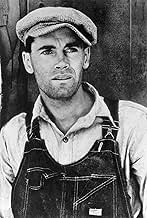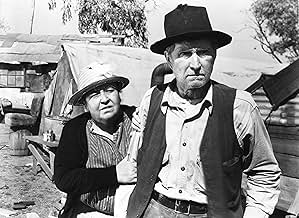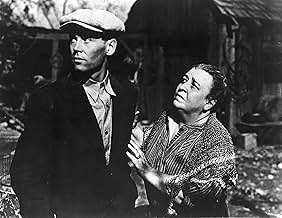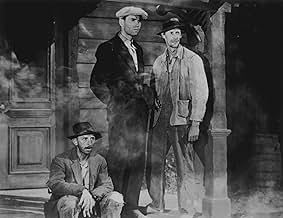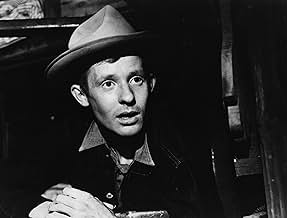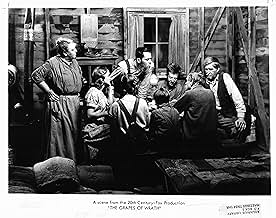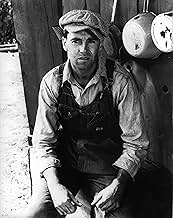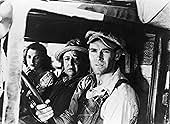Uma família pobre no Centro-Oeste é forçada a abandonar suas terras. Eles viajam para a Califórnia, sofrendo os infortúnios dos sem-teto na Grande Depressão.Uma família pobre no Centro-Oeste é forçada a abandonar suas terras. Eles viajam para a Califórnia, sofrendo os infortúnios dos sem-teto na Grande Depressão.Uma família pobre no Centro-Oeste é forçada a abandonar suas terras. Eles viajam para a Califórnia, sofrendo os infortúnios dos sem-teto na Grande Depressão.
- Direção
- Roteiristas
- Artistas
- Ganhou 2 Oscars
- 13 vitórias e 6 indicações no total
- Direção
- Roteiristas
- Elenco e equipe completos
- Produção, bilheteria e muito mais no IMDbPro
Resumo
Avaliações em destaque
Henry Fonda plays the part of Tom Joad, a young member of the family who is released from prison at the beginning of the film, only to find that his family has been driven from their home and is staying at his uncle's house until they can figure out what to do about their sudden homelessness. It is by pure coincidence that Tom was released early on good behavior, otherwise he may very well never have seen his family again. He finds them in a state of near desperation, as they begin more and more to realize the predicament that they are in. Their trek across half of the country, on their way to California to assume jobs that they've heard about, provides for a substantial portion of the plot and is extremely well-structured.
The family encounters every hardship imaginable on this journey, from family members dying to their struggle to feed themselves to their rickety old truck constantly breaking down. They run into disillusioned people who claim that they've been to California and there are really no jobs there, at least not nearly as many as there are people going to look for them. They are periodically and derogatorily referred to as `Okies,' a term which places them in a broad category of poor folks driven from there homes in middle America who are traveling to the coast to get jobs that aren't there. There is so much doubt and hardship presented that it is never really certain whether they really will find jobs. The audience is never able to assume a happy ending, because there is so much contrary foreshadowing throughout the film.
The struggles do not abate once the family reaches California and takes up shaky residence in residential areas that would be more accurately referred to as shanty towns, and the rest of the film is dominated by the family's efforts to survive in a new and unfamiliar place, while working for wages that are barely sufficient to prevent starvation. Ma Joad spends the majority of the film stressing the importance of keeping the family together, seeing it as the only thing that they really had left, but this is eventually set aside in favor of each member of the family not only surviving but also flourishing, which provides for one of the many powerful messages that the film delivers.
The Grapes of Wrath is not exactly an edge of your seat film, but it is a shockingly realistic portrayal of the suffering that so many people and families experienced during the Great Depression. The performances are flawless, and the experience is not only powerful and moving but also educational. It's no secret that most people do not watch movies to learn, but there comes a point, at least once in a great while, when a person should watch a film that requires a little mental thought processing, and in such cases, The Grapes of Wrath is an excellent choice.
Of course the most controversial parts of the book are left out (like its final image, for example), but Ford still managed to work around the constraints forced upon him to fashion a hard-biting film. Henry Fonda is perfect casting for Tom Joad--never have his otherworldly eyes been used to greater effect. And Jane Darwell is pitch-perfect as Ma Joad--she captures the tough-as-nails dignity that the character has in the novel. The whole movie is lit by expert cinematographer Gregg Toland, who uses shadow and reflection to cast a ghostly pall over everything. Indeed, much of what Ford wasn't able to include in the film as words he communicates instead through images, and isn't that what a good book-to-film adaptation should do? One of those films that feels ahead of its time.
Grade: A
For most of America the Depression started with the stock market crash of 1929. But for the farmers it really began at the end of World War I. Those were good years for agriculture, the war in Europe was a boom for agriculture. But when farm prices dropped after the Armistice, a whole lot of family farms went belly up. Lots of people left the farms for the big city and industry jobs. The Depression years unhappily coincided with some of the worst drought ever seen in America.
This is what many families like the Joads were facing in 1939 when the book was written. The banks had foreclosed on land that had withered to dust in any event. Folks like the Joads picked up and moved elsewhere, like California on a rumor of prosperity and jobs.
America was still changing from an agricultural to an industrial society back then. That causes a lot of trouble for people unskilled in any industrial job training. As a country we're going through something similar today in many areas. We're moving from an industrial to an information based economy. Industry jobs are being lost to other nations and older and poorer workers are suffering for it. It's progress I guess, but it takes its toll.
Some factory worker who has lost his job for any number of reasons can identify to some degree with the Joads, especially if they've lost a home they owned. For the Joads it was worse because they made their living off the land for many generations, identifying with it in a way that industrial workers could not.
Henry Fonda got his first Oscar nomination for Tom Joad. To get the part which he knew he was so right for, he signed a studio contract with 20th Century Fox. That caused him many problems later on, but those are stories for another film review.
Tom Joad is a midwest country kid, a whole lot like Fonda himself. Part of the story of The Grapes of Wrath is Tom himself trying to figure out why these economic forces are crushing him and his family and the way of life he's known. In the end when he leaves the Joad family and hits the open road, he's not got all the answers, but he's asking the questions. Tom hasn't figured it out, but a lot of people with many letters after their names haven't either. He only knows that he's got to get in the fight for economic justice.
Jane Darwell was in films from the earliest silent films to Mary Poppins in 1965. This became her career part and the mother role of all time. She's what holds the Joad family together in good times and bad. That's what moms do and get little recognition for it. Except in this case by the Motion Picture Academy.
John Carradine has his career part in this also. Another John Ford favorite, Carradine plays Casy the defrocked preacher who as he tells it disgraced himself with a female parishioner. After that preaching the gospel didn't seem quite right. When Fonda meets Carradine after Fonda's been released from prison, Carradine is asking a lot of questions about what is man's place in the metaphysical scheme of things. He's developing what we would now call situational ethics. Carradine's questions are on a higher plane, but he certainly inspires Fonda to ask for some answers himself.
The Grapes of Wrath illustrates that at least government can give first aid in a crisis. After being in privately run agricultural camps where they're treated like less than dirt, the Joads happen upon a camp run by the Department of Agriculture where at least they're treated like humans. As it turns out, the Secretary of Agriculture was one Henry A. Wallace who was running for Vice President that year with Franklin D. Roosevelt. I'll bet any number of people saw The Grapes of Wrath and saw a message of support for FDR and the New Deal.
Given some of the problems of the American economy today, The Grapes of Wrath though it appears dated isn't really all that much a relic of our past. It's both a timeless book and a timeless classic film.
Você sabia?
- CuriosidadesPrior to filming, producer Darryl F. Zanuck sent undercover investigators out to the migrant camps to see if John Steinbeck had exaggerated about the squalor and unfair treatment meted out there. He was horrified to discover that Steinbeck had actually downplayed what went on in the camps.
- Erros de gravaçãoThe character, Noah (Frank Sully), after he's seen playing with his boat in the river, simply drops out of the story without any explanation, and does not appear again. In the book there is a brief reference to him going off on his own, but no explanation, whatever, is given in the film for his departure.
- Citações
Tom Joad: I been thinking about us, too, about our people living like pigs and good rich land layin' fallow. Or maybe one guy with a million acres and a hundred thousand farmers starvin'. And I been wonderin' if all our folks got together and yelled...
Ma Joad: Oh, Tommy, they'd drag you out and cut you down just like they done to Casy.
Tom Joad: They'd drag me anyways. Sooner or later they'd get me for one thing if not for another. Until then...
Ma Joad: Tommy, you're not aimin' to kill nobody.
Tom Joad: No, Ma, not that. That ain't it. It's just, well as long as I'm an outlaw anyways... maybe I can do somethin'... maybe I can just find out somethin', just scrounge around and maybe find out what it is that's wrong and see if they ain't somethin' that can be done about it. I ain't thought it out all clear, Ma. I can't. I don't know enough.
Ma Joad: How am I gonna know about ya, Tommy? Why they could kill ya and I'd never know. They could hurt ya. How am I gonna know?
Tom Joad: Well, maybe it's like Casy says. A fellow ain't got a soul of his own, just little piece of a big soul, the one big soul that belongs to everybody, then...
Ma Joad: Then what, Tom?
Tom Joad: Then it don't matter. I'll be all around in the dark - I'll be everywhere. Wherever you can look - wherever there's a fight, so hungry people can eat, I'll be there. Wherever there's a cop beatin' up a guy, I'll be there. I'll be in the way guys yell when they're mad. I'll be in the way kids laugh when they're hungry and they know supper's ready, and when the people are eatin' the stuff they raise and livin' in the houses they build - I'll be there, too.
Ma Joad: I don't understand it, Tom.
Tom Joad: Me, neither, Ma, but - just somethin' I been thinkin' about.
- Versões alternativasInternational distributions (e.g. UK) have a short ~30 second prologue at the beginning to explain the historical context to the story to touch on the socio-economic problems in the US which arose during the Great Depression and the concurrent Dust Bowl.
- ConexõesEdited into John Ford, l'homme qui inventa l'Amérique (2019)
- Trilhas sonorasRed River Valley
(uncredited)
Traditional
Played during the opening credits and often in the score
Sung by Henry Fonda at the dance
Principais escolhas
Detalhes
- Data de lançamento
- País de origem
- Idioma
- Também conhecido como
- Vinhas da Ira
- Locações de filme
- Santa Rosa, Novo México, EUA(service station, diner, bridge, train sequence)
- Empresa de produção
- Consulte mais créditos da empresa na IMDbPro
Bilheteria
- Orçamento
- US$ 800.000 (estimativa)
- Faturamento bruto mundial
- US$ 7.304
- Tempo de duração2 horas 9 minutos
- Cor
- Proporção
- 1.37 : 1


